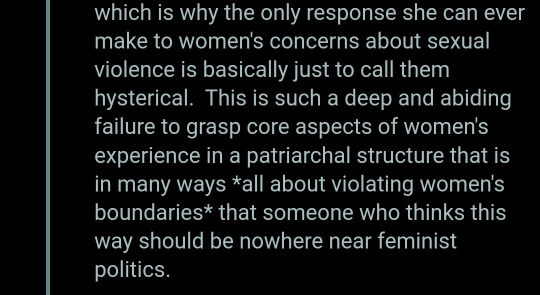#judith butler
Text
In this book you focus on the idea of gender as a global ‘phantasm’ – this charged, overdetermined, anxiety- and fear-inducing cluster of fantasies that is being weaponised by the right. How did you go about starting to investigate that?
Judith Butler: When I was burned in effigy in Brazil in 2017, I could see people screaming about gender, and they understood ‘gender’ to mean ‘paedophilia.’ And then I heard people in France describing gender as a Jewish intellectual movement imported from the US. This book started because I had to figure out what gender had become. I was naïve. I was stupid. I had no idea that it had become this flash point for right-wing movements throughout the world. So I started doing the work to reconstruct why I was being called a paedophile, and why that woman in the airport wanted to kill me with the trolley.
I’m not offering a new theory of gender here; I’m tracking this phantasm’s formation and circulation and how it’s linked to emerging authoritarianism, how it stokes fear to expand state powers. Luckily, I was able to contact a lot of people who translated Gender Trouble in different parts of the world, who were often gender activists and scholars in their own right. They told me about what’s happening in Serbia, what’s happening in Brazil, Chile, Argentina, Russia. So I became a student of gender again. I’ve been out of the field for a while. I stay relatively literate, of course, but I’ve written on war, on ethics, on violence, on nonviolence, on the pandemic… I’m not in gender studies all the time. I had to do a lot of reading.
There’s a lot of focus in the book on how the anti-gender movement has moved across the world in the past few decades, and how it’s inextricable from Catholic doctrine. It was clarifying for me; domestic anti-trans movements in the UK mostly self-identify as secular.
Judith Butler: In the UK, and even in the US, people don’t realise that this anti-gender ideology movement has been going on for some time in the Americas, in central Europe, to a certain degree in Africa, and that it’s arrived in the US by different routes, but it’s arrived without announcing its history. It became clear to me that a lot of the trans-exclusionary feminists didn’t realise where their discourse was coming from. Some of them do; some people who call themselves feminists are aligned with right-wing positions, and it’s confusing, but there it is.
There’s an uncomfortable history of fascist feminism in movements like British suffragism, for instance.
Judith Butler: Yes, and of racism. But when Putin made clear that he agreed with JK Rowling, she was probably surprised, and she rightly said, ‘no, I don’t want your alliance’, but it was an occasion for her to think about who she’s allying herself with, unwittingly or not. The anti-gender movement was first and foremost a defence of Biblical scripture, and of the idea that God created man and woman, and that the human form exists only in this duality and that without it, the human is destroyed – God’s creation is destroyed. So that morphed, as the Vatican’s doctrine moved into Latin America, into the idea that people who advocate ‘gender’ are forces of destruction who seek to destroy man, woman, the human, civilisation and culture.
5K notes
·
View notes
Text
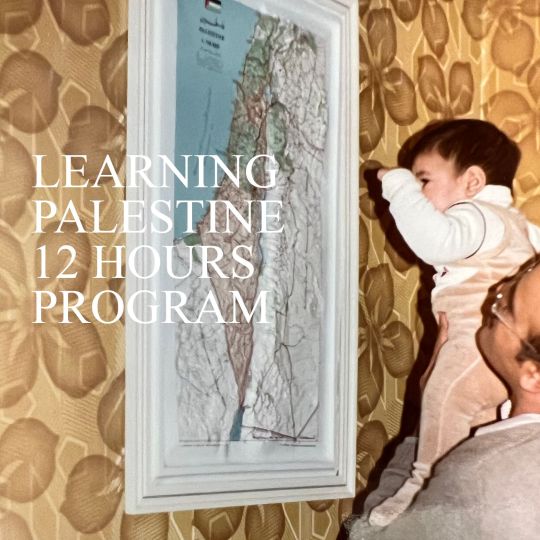
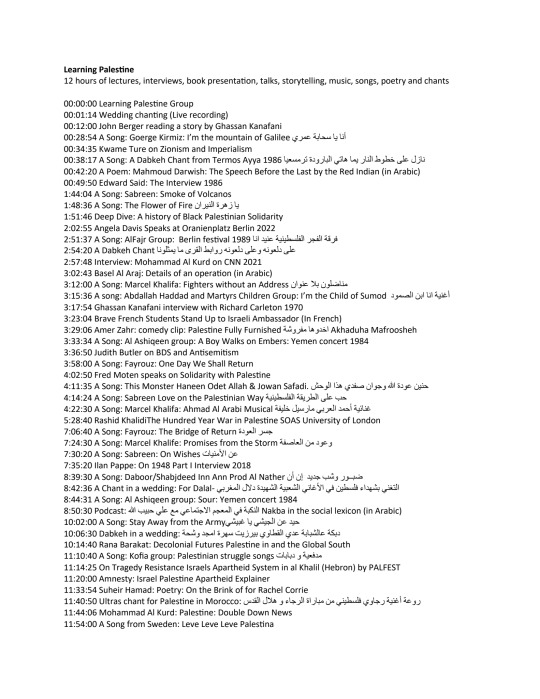
https://www.dropbox.com/sh/41pu2j0alrvmmqq/AADcNEo2K-fsdlacFfuXnKtva?dl=0
Above is the link to an audio file with Palestinian music, read-aloud poetry, storytelling, and excerpts from speeches on history and liberation. It was gathered by Radio Al Hara, an internet radio station broadcast from Ramallah, Bethlehem, and Amman in Jordan, founded during the pandemic as a way to connect during isolation. “Al Hara” means “the neighbourhood” in Arabic. From the river to the sea! 🇵🇸
#palestine#liberation#radio alhara#kwame ture#john berger#ghassan kanafani#edward said#mahmoud darwish#judith butler#angela davis#i actually got to listen to her in berlin that day#and took notes of her entire speech#as it was so amazing!#it was almost exactly a year ago#nothing brings hope like listening to revolutionaries
6K notes
·
View notes
Quote
Those who commit acts of violence are surely responsible for them; they are not dupes or mechanisms of an impersonal social force, but agents with responsibility. On the other hand, these individuals are formed, and we would be making a mistake if we reduced their actions to purely self-generated acts of will or symptoms of individual pathology of 'evil'.
Judith Butler, Precarious Life
877 notes
·
View notes
Text

Hannah Montana’s Guide to Life Under Capitalism
Haven’t posted in a while but made a new video :)
#queer#youtube#video essay#hannah montana#miley cyrus#lgbt#gay#commentary#sociology#critical theory#Judith butler#gender#trans#transgender
254 notes
·
View notes
Text

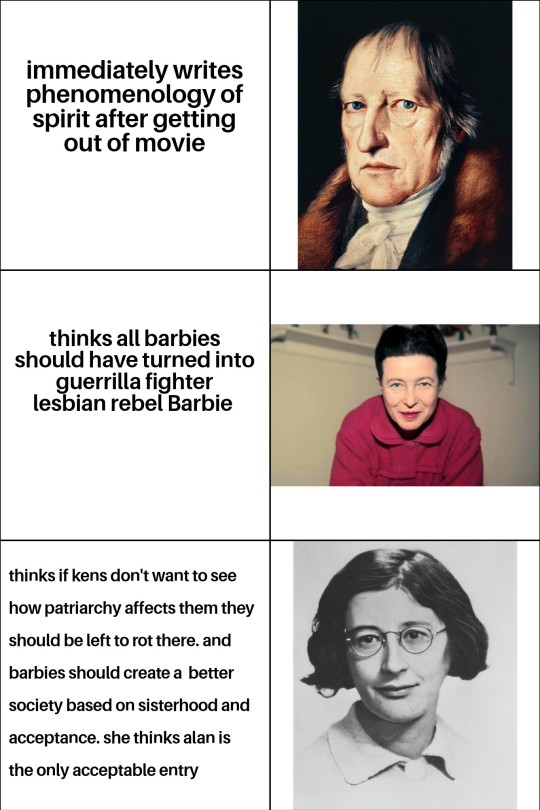
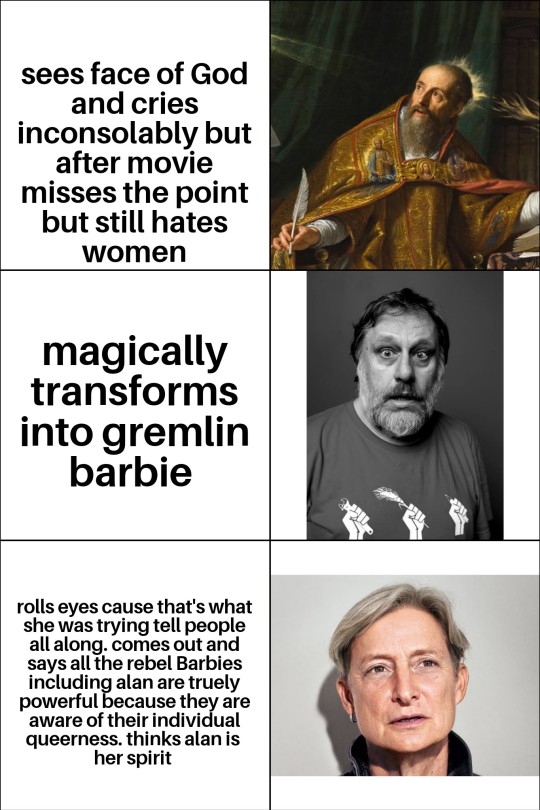
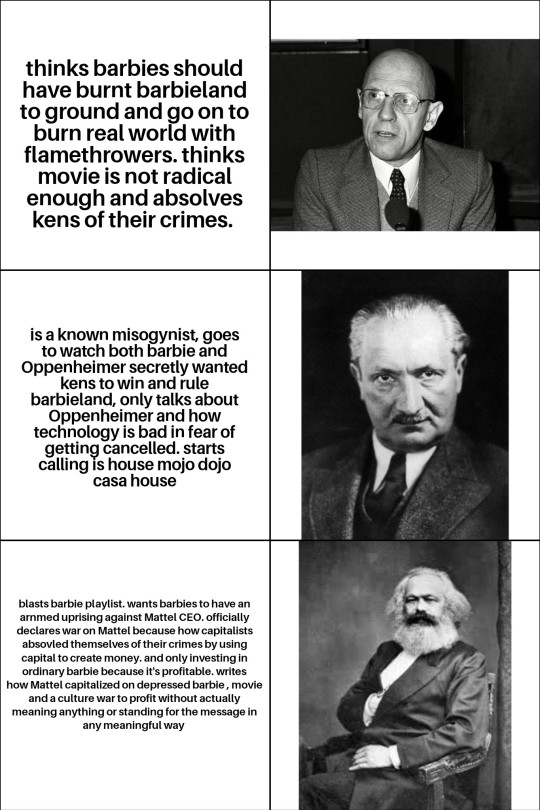
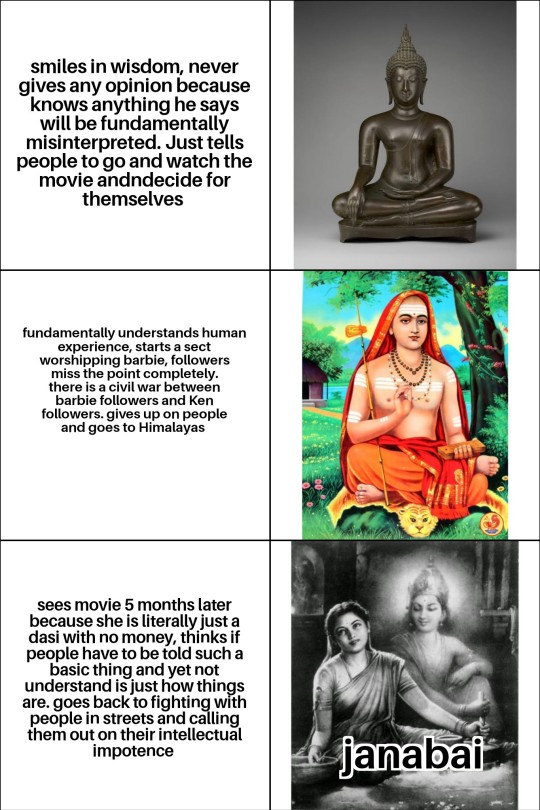
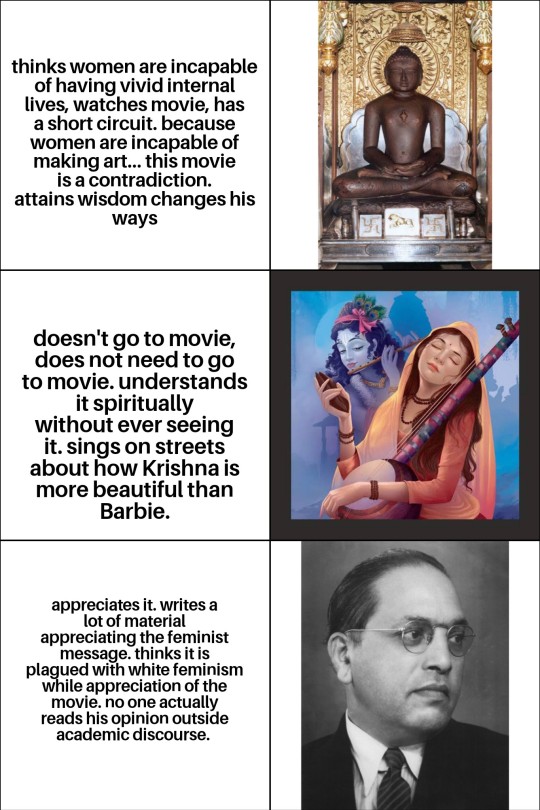
Philosophers on barbie movie
#barbie#philosophy#art#friedrich nietzsche#slavoj zizek#Plato#hegel#simone de beauvoir#simone weil#buddha#judith butler#karl marx#foucault#heidegger
489 notes
·
View notes
Text


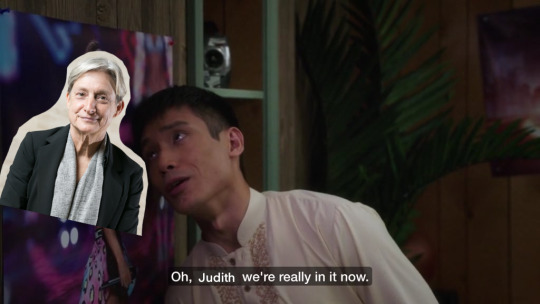

Running this blog mood board
#original post#feminism#anti radfem#anti radical feminism#intersectional feminism#intersectional feminist#marxist feminism#marxist feminist#leslie feinberg#bell hooks#judith butler#kimberlé crenshaw#kimberle crenshaw
313 notes
·
View notes
Text



out of context Judith Butler (all from Undoing Gender)
144 notes
·
View notes
Text
Love is not a state, a feeling, a disposition, but an exchange, uneven, fraught with history, with ghosts, with longings […]
Judith Butler, Take My Advice: Letters to the Next Generation from People Who Know a Thing or Two; from 'Doubting Love'
445 notes
·
View notes
Text
Gender researcher Judith Butler argues that the anti-gender movement is bringing us closer to authoritarianism

The famous gender researcher Judith Butler is out with a new book called Who's Afraid of Gender. In an article in the Los Angeles Times she explain why she thinks contemporary transphobia brings us closer to authoritarianism.
She writes:
The fear of “gender” allows existing powers — states, churches, political movements — to frighten people to come back into their ranks, to accept censorship and to externalize their fear and hatred onto vulnerable communities.
Those powers not only appeal to existing fears that many working people have about the future of their work or the sanctity of their family life but also incite those fears, insisting, as it were, that people conveniently identify gender as the true cause of their feelings of anxiety and trepidation about the world.
The project of restoring the world to a phantasmatic time before gender promises a return to a patriarchal dream order that only a strong state can restore. The shoring up of state powers, including the courts, implicates the anti-gender movement in a broader authoritarian, even fascist project.
We see the rolling back of progressive legislation and the targeting of sexual and gender minorities as dangers to society, as exemplifying the most destructive force in the world, in order to strip them of their fundamental rights, protections and freedoms.
Read the whole article here.
See also:
Feminist philosopher Judith Butler is crystal clear in her condemnation of transphobic feminists
Renowned Feminist Philosopher Judith Butler Tears Transphobic Feminism Apart
Feminist philosopher Judith Butler goes up against anti-trans and anti-gender feminists and conservatives
78 notes
·
View notes
Text
Judith Butler points out that the lesbian categories of "butch" and "femme" are not simple assimilations of lesbianism back into the terms of heterosexuality. Rather, Butler introduces the concept of cultural intelligibility, and suggests that the contextualized and resignified "masculinity" of the butch, seen against a culturally intelligible "female" body, invokes a dissonance that both generates a sexual tension and constitutes the object of desire. She points out that this way of thinking about gendered objects of desire admits of much greater complexity than the example suggests. The lesbian butch or femme both recall the heterosexual scene but simultaneously displace it. The idea that butch and femme are "replicas" or "copies" of heterosexual exchange underestimates the erotic power of their internal dissonance.
“THE ‘EMPIRE’ STRIKES BACK: A POSTTRANSSEXUAL MANIFESTO” by Sandy Stone
#butchfemme#butch/femme#lesbianism#queerness#judith butler#sandy stone#words#queer#addendum: im so dissapointed that sandy stone is a fucking zionist
107 notes
·
View notes
Quote
The humanities give us a chance to read across languages and cultural differences in order to understand the vast range of perspectives in and on this world. How else can we imagine living together without this ability to see beyond where we are, to find ourselves linked with others we have never directly known, and to understand that, in some abiding and urgent sense, we share a world?
Judith Butler, "McGill University commencement address", 2013
#philosophy#quotes#Judith Butler#McGill University commencement address 2013#education#humanities#awareness#humanity
152 notes
·
View notes
Text

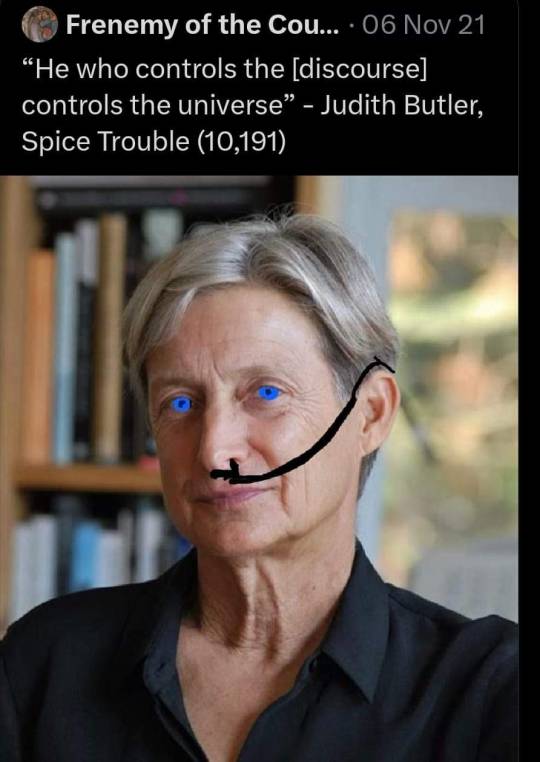
83 notes
·
View notes
Text
Concours de Femmes: Our Dirty Secret
There's a particular facet of womanhood and girlhood that I find to be barely talked about, usually only briefly mentioned in feminist discourse - the competition between women, and beauty standards as a means to even be accepted by other women. I feel like "the competition" (as I will now be referring to it) takes up such a large space within women's lives, and I would argue even more so than the approval and acceptance of men, such a large space that we have barely known alternatives, or what the lack of the competition could look like.
Mainstream feminist discourse often centers around the general idea that "women do not do [xyz] to please men!" - often referring to makeup, cosmetic surgery, and other aesthetic rituals. In reality, in many instances, it genuinely is partially for men, but I will argue that it is mostly for the approval of other women. Women want other women to be jealous of them. Women are in a constant competition to be the most desirable, the most fuckable, and on top of it all, we are in a competition to see who can pretend as though we are not even aware of the mere existence of the competition, who can convince other women that they are the most -effortlessly- desirable and fuckable. Because if you fit a certain beauty standard that traditionally fits what is called the "male gaze", then you also fit in with other women that are in the same place in "the competition" as you.
Mainstream feminist discourse too often focuses on what we, feminists, can do about men, when we, women, are just as wounded by our patriarchal matrix and heteronormative delusions. It is rarely discussed that women will go through lengths of extreme aesthetic alterations (nose jobs, BBLs, lip injections, and whatever else is popular right now) not only to fit the male gaze and feel that euphoric rush of male approval, but also to be accepted by groups of women, to fit into the "pretty" group, for other women to perceive you as competitor. Because ironically, it happens quite often where the more you are seen as competition, the more the competition want to be friends with you. Society loves a group of pretty women. Think of the Kardashians, the Real Housewives, the appeal of sorority culture, and think about how reality shows about groups of pretty women are often solely based around the competition between each other. Because the truth is, we (as a whole) have been conditioned to find entertainment in a "catfight", we're all perverts, eyes and ears glued to the objectified gaggle of women claiming to be "best friends" as they jump through hoops to see who can be the most successful in fame, desirability, money, and often intellect as well. We secretly want them to fail; we have been trained to secretly want our own friends to fail as well.
In terms of desirability, I will speak on personal experience when I say that in adolescence into young adulthood, most girls do not actually want to have sex, especially not with the partners that they usually "choose" in adolescence (I use the term choose very loosely. I actually think young girls often get tricked into thinking they have full control in their choices). No, rather, they would like to be desirable, fuckable. Not only that, but they would especially like to tell their friends about how desirable they are via tales of sexual and romantic (mostly sexual) exploits with boys. Sexual gossip is a very important bonding factor in friendships between girls and young women, and I will argue that for some it is one of the largest reasons why many will partake in our current zeitgeist's soulless digitalized hookup culture.
In high school, I was fascinated and intrigued to hear about the sexual adventures of my girl friends, not only because I had none, but also because none of these stories were positive. They made me sick to my stomach. Stories of boys who refused protection, stories of boys who coerced girls into anal sex, stories of dry, painful penetration, stories of boys getting girls too drunk or stoned to consent. And the girls? Too often did they tell me these stories with a proud smile on their face, thinking that it was funny, not a big deal. I think when you're young you thirst for experience whether it is good or bad. You want stories. You want to be interesting. You're definitely more interesting than your prudish and awkward friend (me). They liked it when I freaked out about these stories. They would reassure me that it wasn't a big deal, as if they were telling me that I will experience it one day, because they think every girl does, and that's just how it is. They liked feeling older, more mature and more experienced than me. They liked when I pried them about their sexual experiences in detail. I only pried because I wondered if they'd get to a point where they really heard themselves, and the words they were saying to me. I don't think anyone's really having any great sex in high school, and everyone was trying to convince everyone else that they were having great sex.
I feel for these girls. I feel for my sixteen year old self that secretly envied these girls. I acted shocked to them as they told me of these traumatic events with a smile on their faces, having read Germaine Greer and De Beauvoir, trying to explain to them why they deserve to be treated better, and how male validation is not worth it. They simply thought I was a silly virgin who did not understand. I secretly wished to have just not thought about these things. Back then I thought things would be so much easier, simpler, if I just let myself be treated that way. I would feel more loved. I would feel closer to my friends. I'd have some really "fun" stories to tell. I felt alienated from my friends because I couldn't relate. Back then I convinced people around me that I was not so lonely. That I didn't see a point in relationships, that I was too busy to bother with them (busy with what?? Algebra 1? Who was I fooling...). That I wasn't so interested in sex. I wanted to act like I was above sex and love (or what high schoolers thought love was). I even identified as asexual and later, gay, for some of this time because I felt so alienated from the adolescent rehearsal of heterosexual sex and love.
But that doesn't mean that I was above an interest in boys - especially platonically. I think I have noticed (as well as perpetrated) women and girls not only competing for sexual and romantic desirability in the eyes of men, but also platonic desirability (which in reality is often just hidden sexual desire because straight men and women often cannot fathom of pure platonic relationships between each other). An example of this is women having a complex, often encouraged by men, that they are "one of the boys". Women saying things like "I just get along better with guys", feeling a sort of competition to see who can have the most male friends. Women can be guilty of valuing men and male friendships over women, just as men can. Men often don't view women as -full people-, and maybe, just maybe, many women subconsciously feel this way too.
Don't get me wrong, I am definitely still trying to shake out of being entrapped within the competition. I think we all are, especially recently. But it's hard when one is surrounded solely by people who are perpetuating the competition further, when one is trapped. I get that. This post is definitely not to bash other women and girls for perpetuating the competition in any way. I was and probably always will be entrapped in the competition in one way or another. We women are all traumatized, brainwashed to romanticize that trauma, and brainwashed to compete in who has more of it, because -trauma makes you interesting-. I think it's getting better, I really do, but that might also be my experience from the people I choose to surround myself with and love. Sometimes I find myself talking with a girl who I would not normally talk to, and find myself back in high school again, prudish as she is beaming with tragedy.
I think when women live in more privileged societies in terms of gender equality (I mean as in, women who are not forced into marriages, are able to access education, etc.), internalized misogyny is just as important of an issue to address as the everyday misogynies of men. It is too often that men pit women against each other, especially explicitly, and women will agree and be complicit to it. It starts with recognizing the misogynies. It starts with analyzing why you -really hate that girl you have never talked to-. It starts with recognizing the difference in how you act around men versus around women.
Simply saying empty phrases like "girl power!" and "women need to stick together!" means nothing when we merely have an illusion of power and unity in groups of women, because due to internalized misogyny and the competition, what should be a "safe space" is filled with re-enforcers of our own oppression. Women often don't even feel safe in groups of other women, because within every woman is a little misogynist speaking in our ear. It starts with the slow and painful killing of that prick, who has been with you since you learned to speak, and has controlled your speech ever since.
#feminist critique#feminism#divine feminine#intersectional feminism#misandry#radical feminism#radical feminist community#gender critical#male violence#pick me girl#misogny#my opinion#judith butler#andrea dworkin#germaine greer#simone de beauvoir#girlhood#womanhood#feminine rage
96 notes
·
View notes
Text
31.3. Den trans viditelnosti
Dneska je mezinárodní den trans viditelnosti, respektive, podstatněji je Buy a trans woman a pizza day.
Překvapivě,
su trans buzna, dívejte se na mě a kupte mi pizzu.

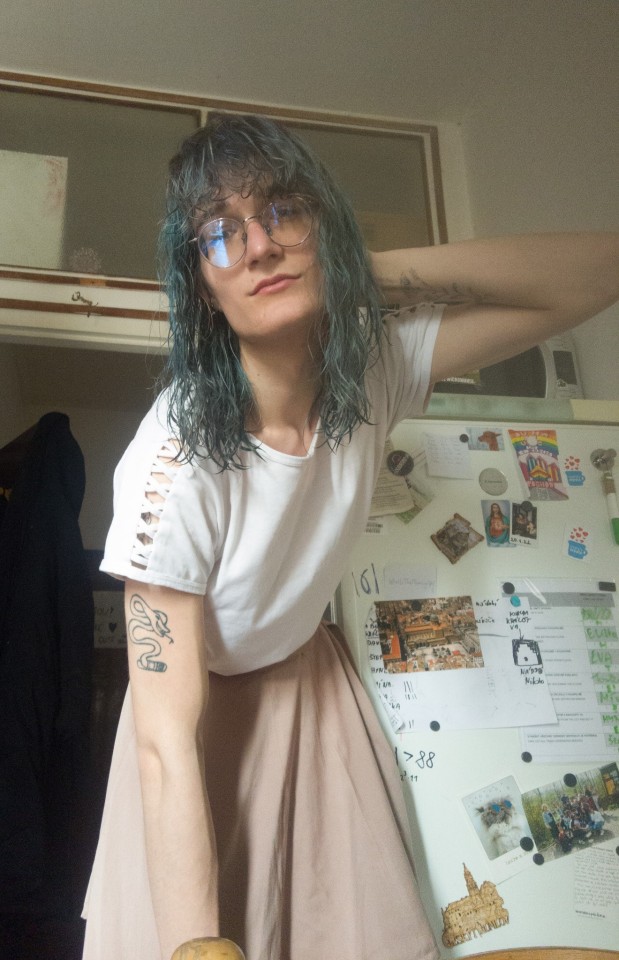
Ok, ale jestli chcete být užitečný,
kupte trans holce pizzu,
běžte 6.4. 12:30 na Staroměstském náměstí na blokádu klerofašistických zkurvenců z Pochodu pro život, a ideálně na nějaký další akce během Týdne pro reprodukční spravedlnost,
vzdělávejte lidi kolem sebe, že tu máme furt nucené sterilizace trans lidí KURVA,
přečtěte si kteroukoliv/všechny z následujících knížek od trans* autorstva:
Nevadu od Imogen Binnie,
Detransition, baby od Torrey Peters,
Who's afraid of gender od Judith Bulter,
A short history of trans misogyny od Jules Gill-Peterson;
5 - kviřte české prostory, poslouchejte a přijměte mezi sebe víc kvír kamarádstva. Zachraňuje to životy.
Díky, a trans práva jsou lidská práva!
Info o akci ✨
#trans#lesbian#dyke#trans day of visibility#den trans viditelnosti#buy a trans woman a pizza day#kup trans holce pizzu#česky#čeština#čumblr#obrození#no pasarán#siamo tutti antifascisti#pro choice#moje tělo moje volba#stop sterilizaci#literatura#Imogen Binnie#Torrey Peters#Judith Butler#jules gill peterson#Kvír#Buď kvír šiř mír#jebat klerofašisty#jestli chce církev chránit děti mohla by začít tím že na ně přestane sahat
51 notes
·
View notes
Note
What flavour of communist and/or gay are you? /Gen
I'm not really sure what this means.
Not to spout clichés or take myself too seriously, but to some extent I think labels confine us within rigid structures which ultimately only serve our enemies. I know it's just a shortcut, but even the fact that you say 'flavour' kinda reiterates the idea that lots of the associated terminology positions us as existing for consumption.
Of course I know language matters. Indeed, I think a disproportionately large amount of leftist in-fighting is down to word choice and communication. More often than not, when anarchists refer to the state and Leninists refer to capital or bourgeois democracy, we're all talking about the same systems of harm and oppression. I also believe that what's most important is what we do, not how we identify.
I actively avoid the 'discourse' surrounding queer terminology. For years in my youth I railed against the word 'bisexual' because I didn't like that it implied I have two distinct sexualities, and for awhile I even called myself 'ambisexual' in an attempt to prompt a deconstruction thereof. But then I decided that I like the colours of the bi flag, which is really all that matters, because it's just aesthetics.
So I guess let me put it this way: I'm a trade union organiser who specifically represents queer union members. I grew up reading Marx, and some of the greatest influences through my adolescence on how I approach the world were Gramsci and Mao, and later Fanon and Butler. I spent a lot of my twenties questioning whether I count as trans, as I have always been very comfortable with both my masculinity and my femininity, but at some point I realised very clearly that the gender I was assigned at birth is not reflected in either.
I very strongly believe in the value of Lenin and Leninism to global struggle; but likewise I have taken a lot from Malatesta, Luxemburg, Adorno, and so on. I also think, while they are to be scrutinised rigorously, there is much to be gained from the likes of Trotsky, Foucault, or Žižek. I am a staunch anti-Zionist, but Memmi nevertheless teaches us a great deal about the plight of the colonised.
I am probably closer to an orthodox Marxist than I am to a Leninist or anarchist, but ultimately I think all this orthodoxy reeks of bourgeois affectation. The questions we should be asking are: who is most impacted by the realities of a given situation, and what are they saying, what do they need? Once upon a time in the west, and certainly still in most cases, this is BIPOC and sexual others, so we read Davis and Feinberg and Öcalan and Ahmed and Tuck and Yang. It is the strength of the revolutionary to adapt to the material conditions at hand, and remain undaunted.
In the end, we have more in common with one another than we have with ruling classes, right? So let us gather together! If this is the final struggle, let each stand in our place.
#Marxism#Antonio Gramsci#Lenin#Judith Butler#Rosa Luxemburg#Angela Davis#Leslie Feinberg#Sara Ahmed#Tuck & Yang#Marx#Karl Marx#V.I. Lenin#Mao Zedong#Mao Tse-Tung#Theodor Adorno#Errico Malatesta#Albert Memmi#Abdullah Öcalan#Eve Tuck#K. Wayne Yang#original#communism#communist#Frantz Fanon#ask
86 notes
·
View notes

